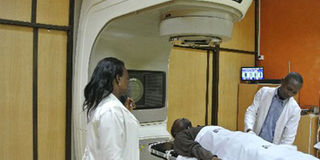50 cancer patients affected as key machine breaks down again

Doctors prepare a patient for treatment using the Linear Accelerator (Linac) machine at Texas Cancer Centre. PHOTO | SARAH OOKO | NATION MEDIA GROUP
What you need to know:
- Head of Cancer Treatment Centre Dr Eliud Njuguna said contractors are fixing the radiotherapy machines that broke down on Tuesday.
- This comes as Nation learnt cancer patients will have to wait until March for the ‘one-dollar-a-month’ drugs promised by the government.
Last year, Novartis signed an MoU with the Ministry of Health to provide cheaper drugs for the non-communicable diseases.
Cancer care in Kenya it seems will remain a major challenge after a radiotherapy machine at Kenyatta National Hospital broke down for the third time in a row.
One of two radiotherapy machines broke down on Tuesday evening affecting about 50 patients on treatment, according to Head of Cancer Treatment Centre Dr Eliud Njuguna.
He said ‘a sensitive part of the machine that controls the radiation beam” is faulty and the contractors are fixing it.
“It should be ready tomorrow | Friday |. The worst case scenario would be is if they can’t fix it and we have to call the engineer from Tunisia which may take a couple more days,” Dr Njuguna said even affordable medicine remains out of reach.
A new cancer machine—the Linear Accelerator— is expected to take the first three patients Thursday, Dr Njuguna said.
ONE-DOLLAR-A-MONTH DEAL
This comes as Nation learnt cancer patients will have to wait until March for the ‘one-dollar-a-month’ drugs promised by the government.
This will also affect diabetes, hypertension and heart patients who were banking on the deal signed by the Ministry of Health and a pharmaceutical company, Novartis.
Last year, Novartis signed a Memorandum of Understanding with the Ministry of Health to provide cheaper drugs for the non-communicable diseases.
The company was to provide both patented and generic medicines which would cost as little as Sh102 ($1).
Without the deal, a patient would pay between Sh5, 000 and Sh55, 000 for a monthly dose of the drugs.
A source at the Swiss Pharmaceutical firm who wished to remain anonymous said delayed delivery of the drugs is caused “too much protocol.”
Another challenge is registration of some drugs with the Pharmacy and Poisons Board. "Therefore we could not bring them in,” said the source
Delays in signing “some crucial” documents have also complicated the deal.






